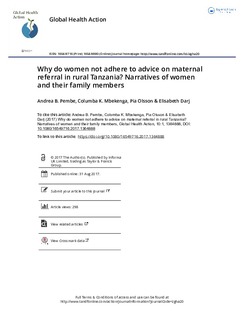| dc.contributor.author | Pembe, Andrea | |
| dc.contributor.author | Mbekenga, Columba | |
| dc.contributor.author | Olsson, Pia | |
| dc.contributor.author | Darj, Elisabeth | |
| dc.date.accessioned | 2018-06-25T07:33:58Z | |
| dc.date.available | 2018-06-25T07:33:58Z | |
| dc.date.created | 2017-10-02T09:41:18Z | |
| dc.date.issued | 2017 | |
| dc.identifier.citation | Global health action. 2017, 10 (1). | nb_NO |
| dc.identifier.issn | 1654-9880 | |
| dc.identifier.uri | http://hdl.handle.net/11250/2502744 | |
| dc.description.abstract | Background: In most low-income countries, many women with high-risk pregnancies and complications do not reach the referral hospitals despite the provision of referral advice. Objective: To explore how antenatal maternal referral advice is understood and handled in a rural Tanzanian community. Methods: Individual in-depth interviews were conducted with six women who did not go to hospital and 13 people who were involved in the referral advice. Narrative analysis was used to describe and create meanings out of the decision-making process. Results: In all interviews, not following the referral advice was greatly influenced by close family members. Three main traits of how referral advice was understood emerged: convinced referral is not necessary, accepting referral advice but delayed by others, and passive and moving with the wind. The main reasons given for declining the referral advice included discrediting midwives’ advice, citing previous successful deliveries despite referral advice; being afraid of undergoing surgery; lack of support for care of siblings at home; and high costs incurred during referral. Conclusions: Declining maternal referral advice centred around the pregnant women’s position and their dependence on the family members around them, with a decreased ability to show autonomy. If they were socially and economically empowered, women could positively influence decision making during maternal referrals. | nb_NO |
| dc.language.iso | eng | nb_NO |
| dc.rights | Navngivelse 4.0 Internasjonal | * |
| dc.rights.uri | http://creativecommons.org/licenses/by/4.0/deed.no | * |
| dc.title | Why do women not adhere to advice on maternal referral in rural Tanzania? Narratives of women and their family members | nb_NO |
| dc.type | Journal article | nb_NO |
| dc.type | Peer reviewed | nb_NO |
| dc.description.version | publishedVersion | nb_NO |
| dc.source.pagenumber | 9 | nb_NO |
| dc.source.volume | 10 | nb_NO |
| dc.source.journal | Global health action | nb_NO |
| dc.source.issue | 1 | nb_NO |
| dc.identifier.doi | 10.1080/16549716.2017.1364888 | |
| dc.identifier.cristin | 1501222 | |
| dc.description.localcode | © 2017 The Author(s). Published by Informa UK Limited, trading as Taylor & Francis Group. This is an Open Access article distributed under the terms of the Creative Commons Attribution License (http://creativecommons.org/licenses/by/4.0/), which permits unrestricted use, distribution, and reproduction in any medium, provided the original work is properly cited. | nb_NO |
| cristin.unitcode | 194,65,20,0 | |
| cristin.unitname | Institutt for samfunnsmedisin og sykepleie | |
| cristin.ispublished | true | |
| cristin.fulltext | original | |
| cristin.qualitycode | 1 | |

